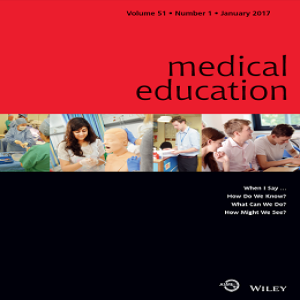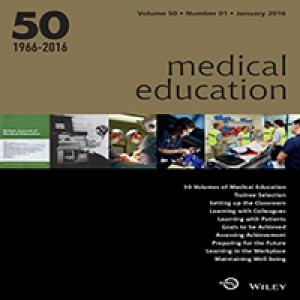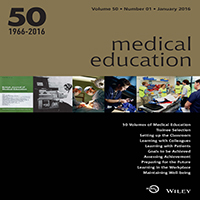Episodes

Thursday Jul 01, 2021
Thursday Jul 01, 2021
Hanrahan et al. examine 31 years worth of data from 5 residency programs and demonstrate a temporal relationship between interview date and applicant rank; earlier interviewees tend to rank higher.
Read the accompanying article to this podcast: You never forget your first? Impact of interview timing on institutional rank order.

Thursday Jul 01, 2021
Thursday Jul 01, 2021
While the UK and Australia recognise tensions between local and global goals, Australia appears to prioritise community values and ‘nation building’ whereas UK discourses focus on social mobility and individual responsibility.
Read the accompanying article to this podcast: Meritocratic and fair? The discourse of UK and Australia's widening participation policies.

Monday Jun 14, 2021
Monday Jun 14, 2021
The authors demonstrate that collaborative learning between pairs of medical students is perceived and valued differently by different stakeholders in the clinical setting, particularly with respect to the patient perspective.
Read the accompanying article to this audio paper: Is two a crowd? A qualitative analysis of dyad learning in an OBGYN clinical clerkship.

Monday Jun 14, 2021
Monday Jun 14, 2021
Over the last 20 years, the number of #MedEd reviews has grown >2600% (4200% for scoping reviews). To explore this growth, Maggio et al. conducted a scoping review of 101 scoping reviews across 14 journals.
Read the accompanying article to this audio paper: Scoping reviews in medical education: A scoping review.

Tuesday Jun 01, 2021
Tuesday Jun 01, 2021
Noting that interviewed residents described asking for help as an act of performance, Jansen et al. use a sociocultural lens to address the role of the healthcare team and learning environment in help-seeking.
Read the accompanying article to this podcast: An act of performance: Exploring residents’ decision-making processes to seek help.

Tuesday Jun 01, 2021
Tuesday Jun 01, 2021
Gonzalez et al. demonstrate a deep chasm between clinical students' acceptance of #implicitbias and identification of strategies to mitigate such bias without targeted instruction.
Read the accompanying article to this podcast: Qualitative analysis of medical student reflections on the implicit association test.

Tuesday Jun 01, 2021
Tuesday Jun 01, 2021
When do incentives backfire? Wisener et al. explore how schemes intended to support clinicians in their teaching roles should be crafted with care given their complex – and at times surprising – influences on motivation.
Read the accompanying article to this audio paper: Incentives for clinical teachers: On why their complex influences should lead us to proceed with caution.

Tuesday Jun 01, 2021
Tuesday Jun 01, 2021
Mosley et al. demonstrate that non-white medical students experience cognitive dissonance around the presentation of race and race-disease associations in medical education.
Read the accompanying article to this audio paper: Thinking with two brains: Student perspectives on the presentation of race in pre-clinical medical education.

Friday Apr 30, 2021
Friday Apr 30, 2021
By showing promotion in medical education is shaped by ideologies that create different experiences for men and women, Varpio et al. offer insight into how we might reverse the underrepresentation of women in the field's highest ranks.
Read the accompanying article to this podcast: Attaining full professor: Women’s and men’s experiences in medical education.

Friday Apr 30, 2021
Friday Apr 30, 2021
The authors illustrate how rewards for teaching activities send a message, building morale by conveying that the educational mission remains a priority in this era of increasing clinical and administrative pressure.
Read the accompanying article to this podcast: Physician‐faculty perceptions towards teaching incentives: A case study at a children’s hospital.

